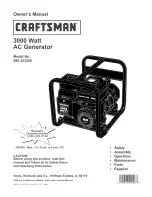
Do not contact muffler area with engine running. Muffler gets
extremely hot and can cause severe burns. Exhaust gases can
ignite combustible items such as clothing or structures in close
proximity. Gases leaking from worn muffler can heat up and
damage fuel tank resulting in fire or explosion.
•
DO NOT
touch hot parts of engine or muffler.
•
AVOID
hot exhaust gases.
• Keep a minimum of 5 ft. (1.5M) clearance on all sides of the engine including top.
Starter and other rotating parts of engine can entangle hair, hands,
clothing and accessories.
•
NEVER
operate with protective housing or covers removed.
•
DO NOT
use while wearing loose clothing or jewelry that may get caught up
in starter or other rotating parts. Tie up long hair or wear hair net or cap.
MAKING ADJUSTMENTS OR REPAIRS TO THE ENGINE
Excessively high operating speeds increase risk of injury and damage to
engine. Excessively low speeds produce heavy load on engine.
•
DO NOT
attempt to alter pre-set governed speed. Engine governor is factory
set to supply optimum output horse power (HP) when running at governed speed.
•
DO NOT
modify engine in any way.
TESTING SPARK PLUG FOR SPARK
• DO NOT
check spark plug for spark by removing from head cylinder.
• Disconnect spark plug wire from spark plug and cover tip with
non-conducting material such as electrical tape to prevent it from coming in
contact with spark plug, fuel tank or other parts of the engine where damage
can result from sparking.
• Replace a defective spark plug only with authorized parts.
• Use approved spark plug tester.
•
DO NOT
overfill fuel tank. Leave ample space for expansion of fuel.
•
DO NOT
start engine in area of fuel spillage. Fire and explosion can occur.
• Keep fuel away from sparks, open flames, pilot lights, heat and other ignition
sources.
DO NOT
smoke while operating the engine.
•
DO NOT
tip engine or equipment at angle that could result in fuel spilling
from fuel tank.
STARTING THE ENGINE
Starter cord kickback (rapid retraction) can
pull your hand and arm toward the engine faster than it can be let
go of. Failure to be aware of this function can result in broken
bones, fractures, bruises and sprains can result.
• When starting the engine, pull cord slowly until resistance is felt, then pull
rapidly to avoid kickback.
Unintentional sparking can result in fire or electric shock.
Failure to observe this warning can result in property
damage, severe burns and/or death.
• Ensure spark plug is in place before attempting to start engine.
• Ensure muffler is secured to engine before starting.
• Ensure fuel cap is on fuel tank and tightened securely.
• Ensure air cleaner is clean and properly attached to engine.
A dirty air cleaner element changes the air to fuel ratio and
promotes incomplete combustion of fuel increasing the output of
carbon monoxide. Always make sure air cleaner element is clean
before every operation of the engine.
•
DO NOT
crank engine with spark plug wire removed. The resulting spark
could ignite spilled fuel.
9
10







































